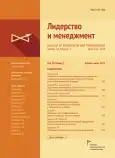Методика исследования культурного кода компании в корпоративно-антропологическом подходе с применением инструментов фасилитации и сторитейлинга для обеспечения устойчивого развития организации
- Авторы: Пистер Е.И.1, Данкин В.Д.2, Медведев С.О.1
-
Учреждения:
- Сибирский государственный университет науки и технологий имени академика М.Ф. Решетнева
- ООО «Центр развития корпоративной культуры» (Тренинг-Бутик)
- Выпуск: Том 10, № 2 (2023)
- Страницы: 657-672
- Раздел: Статьи
- URL: https://journals.eco-vector.com/2410-1664/article/view/608016
- DOI: https://doi.org/10.18334/lim.10.2.117561
- ID: 608016
Цитировать
Полный текст
Аннотация
Ключевые слова
Об авторах
Елизавета Иоганесовна Пистер
Сибирский государственный университет науки и технологий имени академика М.Ф. Решетнева
Email: pisterelizaveta@yandex.ru
доцент кафедры экономики предприятий и отраслей Института инженерной экономики, кандидат экономических наук
Владимир Дмитриевич Данкин
ООО «Центр развития корпоративной культуры» (Тренинг-Бутик)
Email: contact@tboutique.ru
тренер-консультант, куратор центра экспертизы «Корпоративная культура»
Сергей Олегович Медведев
Сибирский государственный университет науки и технологий имени академика М.Ф. Решетнева
Email: Medvedev_serega@mail.ru
доцент кафедры экономических и естественнонаучных дисциплин, старший научный сотрудник кандидат экономических наук
Список литературы
- 1. Абашева О.Ю., Агеев А.О., Алексеева Н.А. и др. Устойчивое и динамичное развитие российской социально-экономической системы: вызовы, перспективы, риски. - Самара: ООО НИЦ «ПНК», 2022. – 212 c.
- 2. Лоффер М. Ретроспектива в Agile. Проверенные методы и инновационные подходы. - М.: Манн, Иванов и Фербер, 2020. – 336 c.
- 3. Керт Н. Ретроспектива проекта: как проектным командам оглядываться назад, чтобы двигаться вперед. - М.: Издательство Дмитрия Лазарева, 2015. – 303 c.
- 4. Бехтерева В., Бехтерева С. Лидер будущего. Как направлять энергию команды с помощью драйв-совещаний и фасилитации. - М.: Манн, Иванов и Фербер, 2021. – 304 c.
- 5. Браунт Д., Крамер И. Корпоративное племя: Чему антрополог может научить топ-менеджера. - М.: Альпина Паблишер, 2018. – 240 c.
- 6. Коул М. Культурологическая психология. - М.: Когитоцентр, 1997. – 131 c.
- 7. Лурье С.В. Обобщенный культурный сценарий и функционирование социокультурных схем // Журнал социологии и социальной антропологии. – 2010. – № 2. – c. 152-167.
- 8. Слесик Е.М. Личностный компонент этической культуры учащихся основной школы как культурно-педагогический феномен // Педагогика и современность. – 2013. – № 6. – c. 83-86.
- 9. Вознесенский И.С. Корпоративная антропология: зарубежный опыт в адаптации для российского читателя // Власть истории и история власти. – 2019. – № 2(16). – c. 178-192.
- 10. Коровкин В.Ю., Булаткин Ю.С. Исследование организационной культуры. Из опыта петербургской школы № 207 // Magiser. – 2022. – № 2. – c. 26-32.
- 11. Калина Н.Д. Модель существенных признаков визуальной культуры как критериев исследования артефактов и конструирования новых визуальных образов // Человек и культура. – 2021. – № 2. – c. 51-63. – doi: 10.25136/2409-8744.2021.2.34486.
- 12. Кузнецова О.Е. Анализ зарубежных исследований организационной культуры школы // Психологическая наука и образование. – 2017. – № 3. – c. 28-36. – doi: 10.17759/pse.2017220303.
- 13. Корякина Н.И. Проектирование модели школы устойчивого развития // Сибирский педагогический журнал. – 2014. – № 2. – c. 129-133.
- 14. Миркин Б.М., Наумова Л.Г. Изучение основ устойчивого развития в школе: интегрированный вариант // Биология в школе. – 2008. – № 5. – c. 48.
- 15. Казько Е.С. Альтернативы в начальной и высшей школе как условие устойчивого развития // Герценовские чтения. Начальное образование. – 2010. – № 2. – c. 215-219.
- 16. Осиева Ю.Г. Формирование информационной культуры будущих учителей начальной школы в соответствии с концепцией устойчивого развития // Герценовские чтения. Начальное образование. – 2011. – № 2. – c. 425-431.
Дополнительные файлы








